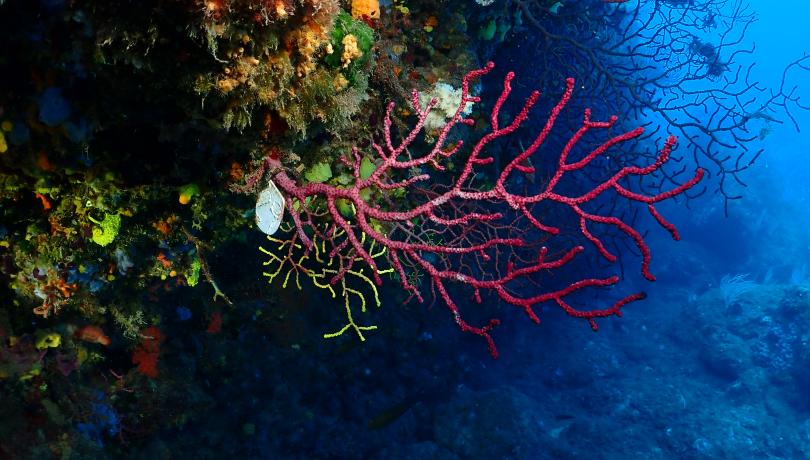New research warns about the limited ability to adapt of the red gorgonian to marine heatwaves
To carry out the study, the research team collected samples of red gorgonians from different populations in the Medes Islands (Girona); Picture: Joaquim Garrabou.
A new study co-led by the Institut de Ciències del Mar (ICM-CSIC) and the Interdisciplinary Centre of Marine and Environmental Research (CIIMAR, Portugal) in collaboration with the Faculty of Biology from Universitat de Barcelona has revealed that the red gorgonian (Paramuricea clavata), an emblematic species of the Mediterranean, has low adaptability to the increasingly frequent and intense marine heatwaves. Published in the prestigious journal Global Change Biology, the research suggests that shallow populations of this species could disappear, even in protected areas, owing to the recurrence of extreme events.
For the study, the research team developed an integrative approach combining experimental ecology, population genetics and in situ thermal regime analyses. They conducted repeated common-garden thermal stress experiments over three consecutive years (2015-2017). To do these experiments, they collected samples from the exact same individuals of red gorgonians from several populations in the Medes Islands (Girona).
During each experiment, the percentage of necrosis in the gorgonian tissues was measured to indicate their thermal stress responses. While in 2015 and 2016, the necrosis percentages at the end of the experiments were below 60%, in 2017, a significant increase in mortality was observed, with almost all colonies dead at the end of the experiment.
Statistical modelling demonstrates the summer thermal regime before the experiment as the main factor affecting the ecological response of the colonies during the three experiments. This also supports that adaptation, whether from genetic or phenotypic plasticity components, play a limited role in the response of this species to marine heat waves.
“Our experiments show that the red gorgonian does not have the adaptive capacity to cope with the increasing frequency and intensity of heatwaves in the Mediterranean,” explains Sandra Ramírez-Calero, ICM-CSIC researcher and lead author of the study. “This lack of adaptation could lead to population collapses in shallow waters, even leading to local extinction”, adds.
Jean-Baptiste Ledoux (CIIMAR, Portugal), the study co-supervisor, adds:
“The originality of this works relies on the fact that our experimental set-up allows to “control” for some of the drivers underlying the individual response to thermal stress. For instance, we used the exact same individuals during the three consecutive experiments, controlling de facto for the genetic component of the individual response to thermal stress.”
Joaquim Garrabou (ICM-CSIC), the study co-supervisor, concludes:
“This study underscores the importance of considering the recurrence of extreme climatic events when making biodiversity projections, and suggests that traditional prediction methods may be insufficient.”
In addition to its value as a symbol of Mediterranean ecosystems, the red gorgonian plays a key role as a habitat forming species. It increases habitat complexity creating refuge for numerous species. P. clavata is indeed essential for the structure and functioning of benthic communities. “Its disappearance could simplify these ecosystems, affecting their ability to provide fundamental services to society,” warns Ramírez-Calero.
Given this scenario, the scientific team stresses that although local conservation measures can be helpful, reducing greenhouse gas emissions remains the key piece to mitigating extreme climatic events linked to anthropogenic climate change and protecting the red gorgonian and other vulnerable species.
